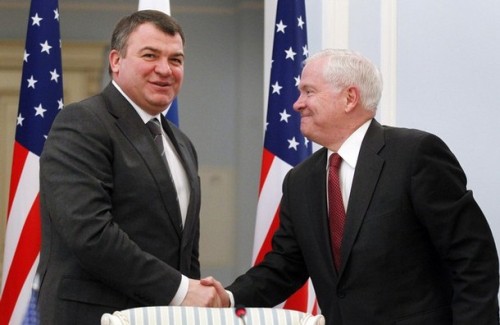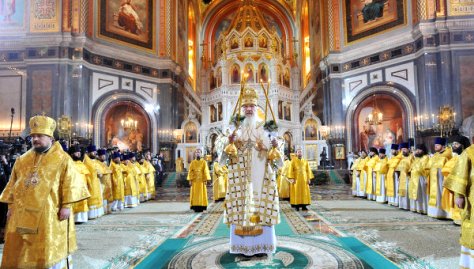
Russian President Dmitry Medvedev, left, listens to Russian Atomic Energy Chief Sergei Kiriyenko during their meeting in the Gorki residence outside Moscow, Tuesday, Jan. 11, 2011. (AP Photo/RIA Novosti, Vladimir Rodionov, Presidential Press Service)
Gorki, Jan 12 (KATAKAMI / KREMLIN.RU) — Mr Kiriyenko briefed Dmitry Medvedev on the completion of the ratification process of the 123 Agreement between Russia and the United States, which opens up opportunities for direct cooperation between the two states in nuclear energy.
The Rosatom CEO also informed the President about the agency’s performance in 2010, in particular, on the establishment in Russia of the world’s first guaranteed reserve of nuclear fuel under an agreement with the IAEA.
Sergei Kiriyenko reported to Dmitry Medvedev on the implementation of the programme for the construction of 28 new nuclear reactors in the country, as well as on the state corporation’s international contracts.
* * *
PRESIDENT OF RUSSIA DMITRY MEDVEDEV: Mr Kiriyenko, last year I signed a law amending some provisions on ROSATOM’s status. I believe it is an important document because it clarifies some of the details and, hopefully, will better equip ROSATOM to address the tasks that are assigned to the state corporation. What is your opinion?
DIRECTOR GENERAL OF THE STATE ATOMIC ENERGY CORPORATION ROSATOM SERGEI KIRIYENKO: Thank you, Mr President, these amendments are extremely important for us. The fact is that when the law on the state corporation was adopted three years ago, many things were different. It was before we launched a large-scale programme of building nuclear power stations, so the law you have signed regulates safety issues more rigorously, especially nuclear and radiation safety during the implementation of the programme for large-scale construction of nuclear power stations.
In addition, the law gives us the authority to tackle the tasks set by you and the Russian Government, in particular, regarding the nuclear icebreaker fleet. When the corporation was created, it was not in charge of the nuclear icebreaker fleet.
The law greatly expands export opportunities. In particular, as per your directive, it gives the state corporation the right to establish representative offices at Russian embassies. We had already coordinated everything with the Foreign Ministry and were just waiting for this law because otherwise we could not implement this programme. Right now we are starting to set up offices at key embassies in countries where we work, because it is crucial to have a permanent presence.
Now, regarding the corporation’s performance in 2010.
DMITRY MEDVEDEV: Go ahead, please.
SERGEI KIRIYENKO: You have touched on an international issue. Perhaps the most significant feature of last year is a series of large-scale international solutions. And just half an hour ago an exchange of notes took place concluding two years of work on the ratification of the agreement between Russia and the United States on cooperation in nuclear energy.
“The most significant feature of last year is a series of large-scale international solutions. And just half an hour ago an exchange of notes took place concluding two years of work on the ratification of the agreement between Russia and the United States on cooperation in nuclear energy.”
DMITRY MEDVEDEV: The so-called 123 Agreement.
SERGEI KIRIYENKO: That’s right, the 123 Agreement. This was a vestige of the past era that the two key nuclear powers had no direct agreements with each other; for example, we could not deliver anything directly to the Unites States or they to us, everything was done through some intermediaries, through third countries. It was totally absurd. Today the agreement has opened up new opportunities for us, which is very important from an economic point of view, because the United States is a key nuclear market. Today we supply more than 40% of fuel for US nuclear power stations under the famous HEU-LEU Agreement. Last year we concluded contracts well in excess of the agreement, since we have signed a supplementary agreement that allows us to circumvent the antidumping restrictions, worth in total $4.9 billion. We already have assets in the United States, taking into account the purchase of Uranium One, which we reported to you last year. On December 20, we extracted the first tons of uranium in the United States for the first time. Today we own 20% of US reserves.
DMITRY MEDVEDEV: That really is good work. What is most important is not to politicise this process, as it happened sometimes in the history of Russian-US relations, but manage it like a business. Strictly speaking, this will also bring the best results.
SERGEI KIRIYENKO: We have excellent new opportunities in the fuel cycle, and, most importantly, on the most promising directions, such as safety, creating conditions for nuclear industry development in third countries, and creating new generation reactors.
Here, too, I would like to report that by December 1 we fulfilled the most important directive issued by the President of Russia, creating the world’s first nuclear fuel reserve bank under IAEA control. It was Russia’s initiative and we implemented it in full. Since December 1 the fuel storage facility in Angarsk, the Irkutsk Region, has been under the control of IAEA inspectors, under IAEA safeguards, and we deposited 120 tons of low enriched uranium there. It is sufficient to completely refuel two large nuclear reactors. This is a unique new situation in the world. Russia has spent more than $300 million, and now the IAEA has the following opportunity: if a country, which is restricted in its efforts to produce nuclear fuel for political reasons, applies to the IAEA Board of Governors, and the Board makes a decision, we immediately open up this fuel bank so that such country can have access to its reserves. Delivery is guaranteed. This is a crucial event for the secure development of the nuclear industry.
Now the Americans are following in our footsteps. Their initiative is just beginning to take shape whereas ours has already been fully implemented.
DMITRY MEDVEDEV: That is very good and very useful but we should not forget about domestic efforts either. Your corporation has a number of projects, including construction. How is the situation there?
SERGEI KIRIYENKO: Everything is going well. If I may, I would like to tell you about our key performance indicators. In accordance with your instructions to state corporations, we have identified key performance indicators, which are set by the supervisory board and on which we report at the end of each year.
We have only the preliminary results now and I will submit to you the final figures when the balance is ready, but their accuracy is very high: we have exceeded all the objectives set by the Government last year. The key issue last year was profit indicators, and our net profit increased by more than 50% compared to 2009 and accounted for more than 60 billion rubles [about $2 billion]. Another very important task was to provide consumers with electricity. It was a difficult year, with the wildfires raging in close proximity to nuclear power stations, if you remember, transmission lines were damaged, and the winter has not been the easiest time, either. So for us it is very important that we have successfully tackled the challenges set by the Government, and even slightly exceeded our targets: we supplied 950 million kWh of electricity more than planned, exceeding our 2009 supplies by more than 4%, or 7 billion kWh.
DMITRY MEDVEDEV: I see that labour productivity has increased by almost 22%.
SERGEI KIRIYENKO: That’s right. Moreover, this is in comparable prices. That’s a key indicator.
DMITRY MEDVEDEV: This is a good indicator.
SERGEI KIRIYENKO: Yes, it is. The supervisory board included labour productivity among basic indicators because the nuclear industry, which was created in the Soviet times, lagged behind our foreign competitors in this area. Labour productivity growth and the creation of political conditions, which you mentioned at the outset, made it possible for us to conclude new international contracts. For us the number of international contracts is a major indicator.
DMITRY MEDVEDEV: The export portfolio has increased by 450%.
SERGEI KIRIYENKO: That’s right. Today we already have a portfolio of orders worth more than $20 billion. We are certain that this year we will increase it by a further 50% to total $30 billion. And the most important thing is the contracts for the construction of nuclear power stations. We have a programme for the construction of 28 nuclear power units in Russia, which has been approved. The deadlines had to be moved back because of the economic crisis but none of the projects have been cancelled. The work is in progress at nine sites. In this regard 2010 was a key year for us. We have commissioned the first nuclear power unit from this batch. We are especially proud that we completed construction in March, according to the schedule, and in November the power station was put into operation.
Now we have very strong growth in the volume of orders due to the new international contracts, because 28 nuclear power units in the country is an enormous programme, but it is already at a fairly high degree of readiness, and we estimate our potential international market at 30 more units, so we will build 28 units in Russia and another 30 abroad. The key countries for us are India, which you visited recently, Vietnam, a new partner for us, and Turkey. We have a unique model of ownership contract, signed last year, which gives Russia, or ROSATOM, the ownership of the nuclear power station on the territory of another country. This is certainly a unique case. This means that we have come to Turkey for 100 years, because the contract stipulates construction, 60 to 70 years of operation and fuel supply. This radically increases the scale of the contract.
Today a number of new countries are showing a great interest in this type of contract. They are ready to follow Turkey’s example and offer us the opportunity not only to build nuclear power stations using Russian technology, but also to be co-owners or owners of nuclear power stations. This option is currently under discussion with our colleagues. (*)










